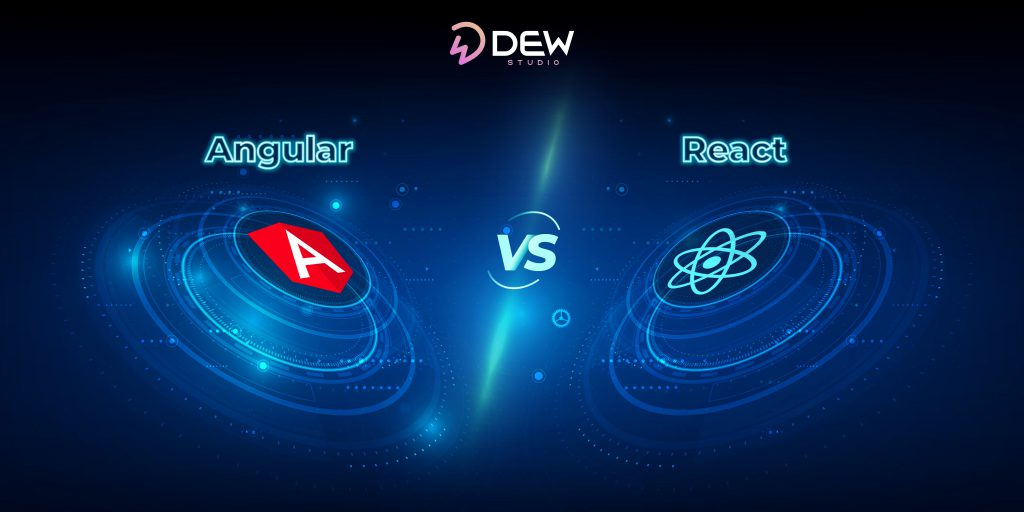Angular vs React is a never-ending discussion that many groups are still debating. Nevertheless, we can analyze both and decide which is the best choice for mobile app development in 2023.
Firstly, whenever there is a debate about mobile app development frameworks, we should not use the word “best.” There can never be a single best tool, as features can be advantageous in some situations and have drawbacks in others. We may never reach a definite conclusion to this discussion, but through detailed analysis, we might understand what to choose when.
Perspectives and situations should always be taken into account when assessing a framework. Making a decision about “what to choose when” is a significant step that we should take. First, realize the purpose. Next, determine what is most suitable for our purpose. Here are the critical steps in mobile application development in 2023 for determining Angular vs. React performance.
Basic Comparison Between Angular And React
- While Google has been responsible for the Angular framework since its release in September 2016. React was introduced by Facebook way back in March 2013.
- Both Angular and React have MIT licensing, but the Data Object Model of React is Virtual, while Angular’s Data Object Model is Real.
- Concerning the type of framework, Angular has a JavaScript framework, and React has a JavaScript library.
- Angular has TypeScript as its language, while React uses JavaScript.
- Angular has a steep learning curve. React has a Flat or Low learning curve.
DEW Studio is a low-code tool that helps build dynamic web and mobile apps. It develops enterprise-grade apps and reduces application development time by 50%.
Angular vs React: A Comparative Study
Let us understand this before proceeding further.
Technological decisions, specifically when choosing a framework for mobile app development, are all about making the right decisions for that particular time. So we should not expect any reinforcement or a concrete preferred choice out of the debate between Angular and React.
All we can do is make a detailed study that provides us with the difference between Angular and React so that we can equip ourselves with the right knowledge that fuels our decision-making skillset before indulging in mobile app development.
- The Architecture
Angular vs. React fundamentally means Framework Vs. Library. Angular is the descendant of AngularJS, so it is a fully MVC framework. React, on the other hand, is a vast library for designing [UX] components. Comparing it to the MVC framework, it addresses only V, while we have to use other libraries for M and C components.
As React has a minimalistic approach, if you are a developer accustomed to doing it all by yourself, React is easy to work on. This is because we can add components in any way we like. In the case of Angular, one must accommodate all the pre-existing libraries. Angular comes with a bundle of components that developers may need.
- Language Expertise
Angular uses TypeScript as its language, which was introduced in 2012. This is relatively modern compared to the JavaScript of React, which was released in the year 1995.
Both dynamically typed JavaScript and statically typed TypeScript have their advantages, depending upon what needs you as a developer or enterprise have in the first place. Despite this, every statically typed language suffers from typos and may require debugging and fixing.
- Scalability Aspect
Angular is highly scalable thanks to its high-power command line interface and its slick and robust design. On the other hand, React makes scaling look easy and efficient, as it is very easy to test.
- Usage of Third-Party Libraries
To tackle JavaScript’s steep learning curve, Google introduced TypeScript. But when third-party libraries are added, even TypeScript tests patience and often turns into a headache. Being a statically typed language, TypeScript should contain all definitions before using them. Working with external third-party libraries makes this difficult.
- Angular vs React Licensing
Angular provides free and open-source licenses. Initially, React came with some patent clauses and many enterprises found it difficult to use freely. After Facebook re-licensed it under MIT licensing, it is still advisable to carefully read the terms and conditions and points of usage of React before using it.
- Speed
Angular takes a considerable amount of time to load its components, especially on mobile devices. On the other hand, React is comparatively sleek, which makes it load quickly.
- Angular and React Frameworks
React and Angular have separate frameworks for aiding the mobile app development process. Angular has Native Script and Ionic 2; React has Next.js, React Sketchapp and React Native. Comparatively, React Native is admired and used by many in mobile app development thanks to its performance and development ease.
Angular Vs. React: The Difference Between React And Angular
Although we are unable to define “best,” we can definitely determine the difference between “Angular” and “React.” In Angular vs. React, who wins depends on your needs and objectives for low-code development.
Always choose the right framework before initiating mobile app development. It will make the app development process smoother. DEW Studio is a powerful Angular low-code development platform that builds apps faster and easier with drag-and-drop components.

